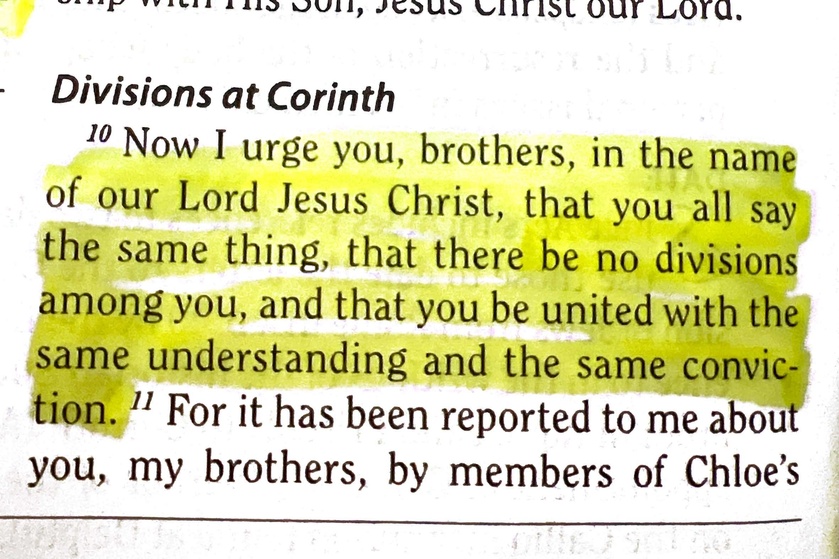United not by style, but by confession: "Jesus is Lord."
1 Corinthians 1:10
"I appeal to you, brothers, [and sisters] by the name of our Lord Jesus Christ, that all of you agree, and that there be no divisions among you, but that you be united in the same mind and the same judgment."
"I follow Paul,"
"I follow Apollos,"
"I follow Cephas, [Peter]"
"I follow Christ."
Substitute "I follow Paul" in our modern context → "I only listen to [insert famous megachurch pastor / podcast preacher]." The loyalty is to the gifted teacher’s style, vocabulary, and brand, not to Christ or the local church body.
Substitute "I follow Apollos" in our modern context → "I only trust the charismatic / experiential / ‘Spirit-led’ stream."
"[insert revival hotspot] is where the real power is; your traditional church is dead."
Apollos was eloquent and "mighty in the Scriptures" with a dynamic style, today it’s the worship leader, the prophetic conference speaker, or the viral healing clip that creates that tribe.
Subscribe to our modern "I follow Cephas [Peter]" → "I only respect the historic, apostolic, sacramental tradition."
"Rome (or Constantinople, or the Anglican ordinariate) has the true succession; you Protestants are just making it up."
Peter represented the original Jewish-Christian pillar; today it’s the "we’ve got the ancient liturgy / magisterium / icons" camp that looks down on "newer" movements.
And then there’s the fourth "I follow Christ" → "I’m spiritual but not religious; I don’t need the institutional church."
"I follow Jesus, not denominations, pastors, or creeds; those just divide."
On the surface it sounds pious, but Paul shows it’s still a faction: it elevates private experience over the visible, and often messy, united church body.
Same four tribes, same 1st-century sin: "My preferred Christian celebrity / tradition / experience is the real measure of authenticity."
Paul’s appeal in v. 10 cuts through all of it: "Is Christ divided?"
Paul doesn’t rebuke their passion. He rebukes their partition. These weren’t just preferences, they were identities. And identity tied to anything other than Christ fractures the body.
Was John MacArthur crucified for you?
Were you baptized in the name of the Pope?
Did Bethel raise you from the dead?
Did the early church fathers atone for your sins?
No. Only Christ.
Ask yourself this: Which slogan secretly lives in your heart?
G. Campbell Morgan, (British evangelist, preacher, a leading Bible teacher), said:
"The more spiritual a man is, the more denominational he is."
But don’t miss his point. He wasn’t cheering for factions. He didn’t mean it as a celebration of tribalism, but quite the opposite. Morgan was exposing the irony. He meant to convey that the more truly spiritual a believer becomes, the more they recognize the whole Church as Christ’s Body, not just their corner of it. In the context of this devotion study today, he was pushing back against the Corinthian spirit, not endorsing it.
He saw "denominationalism" not as loyalty to a brand, but as a deep conviction rooted in Scripture, humbly held within the larger unity of the Body.
True spirituality doesn’t shrink the circle. It expands the table.
Paul here doesn’t call us to agree on everything, but to agree that Christ is everything. To agreeably disagree in Christ. Not uniformity in our religious societies, but unity in the crucified and risen Lord.
Paul’s vision isn’t a bland middle ground. It’s a shared center.
Jesus Christ, and Him crucified (1 Corinthians 2:2).
That said, always beware blind ecumenical people to some degree. Dietrich Bonhoeffer, writing from a Nazi prison cell, gave us one of the most sobering warnings against cheap unity and one of the clearest visions of costly unity.
"Christian unity is not an ideal which we must realize; it is rather a reality created by God in Christ in which we may participate." (From Life Together - 1939)
Unity is not a project we manufacture. It’s a gift we enter.
"We are not to simply bandage the wounds of victims beneath the wheels of injustice, we are to drive a spoke into the wheel itself." (From Letters and Papers from Prison - 1944)
True unity demands confrontation, not just with culture, but with division in the church when it protects sin or pride.
"The cross is laid on every Christian…It is that same cross which unites us." (The Cost of Discipleship)
The only unity that survives all the timely slogans is unity at the foot of the cross. The megachurch fan stands beside the charismatic skeptic at the cross. The Orthodox icon-venerator prays with the Baptist Bible-thumping Sola Scriptura adherents at the cross. The "just Jesus" loner is welcomed back into the messy local church at the cross.
Because all are sinners.
All are saved by God's grace alone.
All belong to Jesus Christ, or none do.
United not by style, but by confession: "Jesus is Lord."
Paul’s appeal isn’t, "Agree with each other." It’s, "Agree that Christ is undivided."
Lay down the slogans. Pick up the cross. Sit at the table, His table, with the rest of the family.
Prayer:
Lord Jesus, You prayed we would be one, so the world would know You were sent. Forgive our slogans. Heal our schisms. Like Bonhoeffer in prison, let us find our unity not in being right, but in being Yours.
Make us one, at the cross, in the Word, around the Table.
Amen.




















